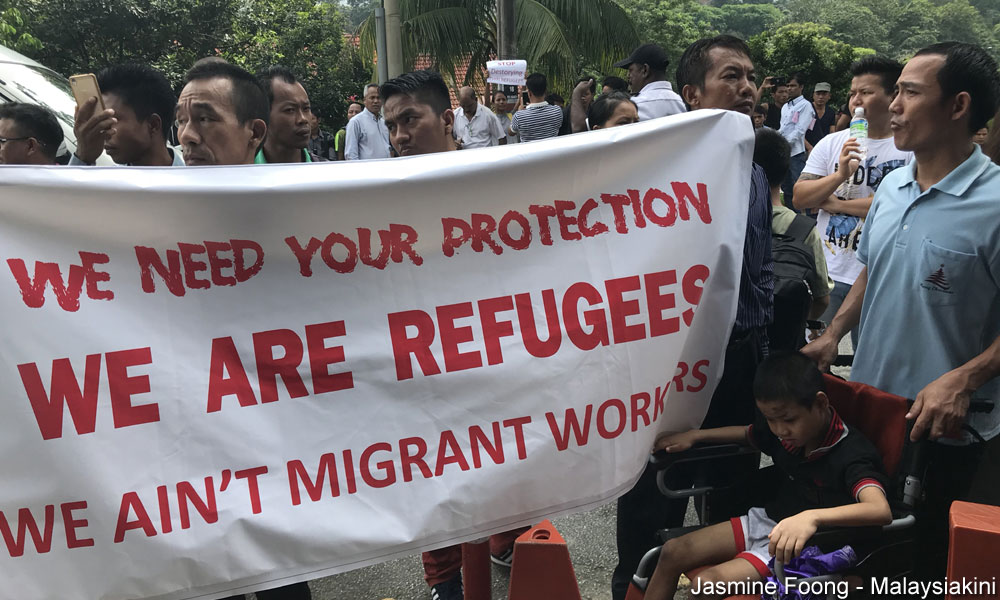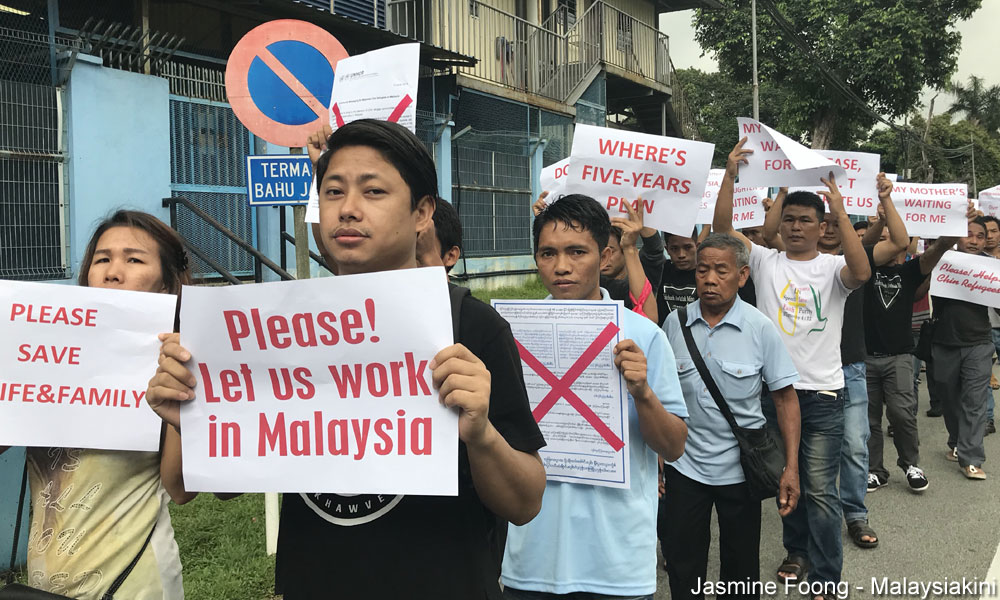Media Statement – 26/6/2019
REVIVE SUHAKAM BY
APPOINTING HUMAN RIGHTS COMMISSIONERS
-
Human Rights suffers in the absence
of functioning National HR Institution(SUHAKAM) in Malaysia
We, the 28 undersigned groups and organizations are appalled
that Malaysia still do not have Human Rights Commissioners in SUHAKAM (Malaysian
National Human Rights Commission) since the term of office of the last batch of
Commissioners came to an end on 27/4/2019, which is about 60 days ago.
The end of the term of office of Commissioners is fixed, and
as such the selection should have been done earlier, and the appointment by the
King should have happened immediately, so that there will never be a time that SUHAKAM
is left without any Human Rights Commissioners.
The Human Rights Commission of Malaysia (SUHAKAM) was established
by Parliament under the Human Rights Commission of Malaysia Act 1999, Act 597.
The first batch of SUHAKAM HR Commissioners started work in April 2000. There
have been many different batches of Commissioners to date, and this also makes
the failure to appoint the new batch of Commissioners immediately unacceptable.
SUHAKAM Cannot Function
Without Human Rights Commissioners
Without Human Rights Commissioners, there is no Human Rights
Commission, and that is why we have not seen any media statements or any new
public inquiries initiated.
All that remains at SUHAKAM are the staff, who without the
Commissioners cannot really do anything. Neither the Prime Minister, Minister
nor can Chief Secretary to the government have the power to direct the work of
SUHAKAM staff. The Act is clear that SUHAKAM staff are not public servants, but
are "member, officer or servant of the Commission’. They are appointed by
the Commission and their work is directed by the Commission.
The Act allows the Commission to delegate powers to the
staff, but without HR Commissioners, there can be no delegation of powers to
the SUHAKAM Staff. On the day, the term of office of past Commissioners
expired, delegated powers also expire, which means SUHAKAM employees cannot
anymore attend(or call for) meetings, organize talks, trainings, conferences
and any other activities until we have new HR Commissioners, hence the
Commission, who can thereafter delegate
powers to staff and give needed direction to its staff.
HR Commissioners also have certain special powers, like the
ability to make unannounced visits to places of detentions, which is important
to ensure strict compliance to human rights standards. A pre-informed visit,
may result in detention authorities, cleaning up and/or even hiding the truth.
Now, without commissioners, this also cannot happen.
Delay in appointment of
Commissioners questions commitment of government to Human Rights
It must be pointed that the immediate past HR Commissioners
have all, save for Prof. Dato’ Dr. Aishah Bidin, have only served their first term of 3 years, and
as such, qualify to be re-appointed to serve their second and final 3-year
term.
As such, the delay in appointment of SUHAKAM Commissioners
raises many questions. Does the new government and Prime Minister want to get a
new batch of HR Commissioners, given the fact that the past chairman, Tan Sri
Razali Bin Ismail and the 7 other HR Commissioners were seen to be committed to
Human Rights and often made statements, even against the government of the day and
its positions, when the Malaysian government fails to defend and promote human
rights.
The last SUHAKAM public inquiry was about the disappearance
of Pastor Raymond Koh Keng Joo and activist Amri Che Mat, whereby the Inquiry panel made up of HR Commissioners Dato
Mah Weng Kwai, Prof. Dato’ Dr. Aishah Bidin and Dr Nik Salida Suhaila Binti Nik
Saleh, did on about 3/4/2019, came to the decision that it was police in particular
Special Branch officers who were responsible for the enforced disappearance of
both Pastor Koh and Amri. Would such a brave finding against the police be a
factor that will not result in their re-appointment as HR Commissioners?
SUHAKAM, if there were Commissioners, would have most likely responded
to many issues in the past couple of months, including also possibly the issues
concerning Orang Asli and environment pollution affecting health.
Effectiveness of
SUHAKAM depend on Commissioners appointed
History has shown us that the effectiveness of SUHAKAM rests
on the Chairman and HR Commissioners appointed.
Under the Chairmanship of Tan Sri Hasmy Agam( 2010-2016) and later, Tan Sri Razali Bin Ismail(2016 – 2019),
who also had sufficient number of good HR Commissioners, SUHAKAM’s image as a
National Human Rights Commission shone and public confidence increased.
Sadly, in the past, when former Attorney General Tan Sri Abu
Talib Othman(2002 – 2010) was the Chairman, SUHAKAM performance was lacking,
save for maybe the individual actions of a couple of HR Commissioners.
As such, the choice of the Chairman and other HR
Commissioners is of primary importance. We need people who are committed to the
defence and promotion of human rights, who will act without fear or favour even
if it means taking a stand against government positions and actions. They will
act without fear or favour, despite knowing that the Prime Minister has the
power to re-appoint them for a 2nd term of 3 years or not.
The power of choosing HR Commissioners effectively lies with
the Prime Minister alone, who is duty bound to consult (but not follow) the
recommendation of the selection committee. The King appoints on the advice of
the Prime Minister. One future reform could be an independent Selection
Committee or process, who selects Commissioners and the King appoints.
Delay In Appointing
Commissioners Prejudicial To Human Rights
The former Barisan National government also delayed the
appointment of SUHAKAM Commissioners, whereby the appointment of the immediate
past team of HR Commissioners was delayed by about 58 days, and before that
there was a delay of 38 days. Now, the delay by the new Pakatan Harapan government
is already 60 days.
Even if the appointment is backdated, it still will not be
able to extinguish the effect of not having HR Commissioners for the past few weeks/months.
SUHAKAM’s response must be contemporaneous and timely, as and
when the issues of violations or otherwise concerning human rights happens or
is highlighted. HR Commissioners also usually make general comments when people
hand over complaints/memorandums concerning human rights issues – something
that is important that cannot happen if there are no HR Commissioners to
receive such complaints.
Human Rights Commissioners are paid a monthly remuneration,
and as such HR Commissioners, entitled to be re-appointed who may be waiting,
are also prejudiced by the current uncertainty and may end up taking up other income generating positions in the
meantime. This is also unfair.
REFORMS Needed in
SUHAKAM
SUHAKAM Commissioners should preferably be full-time HR
Commissioners, and as such their monthly remuneration should be increased to
maybe match the monthly salary of sitting Members of Parliament being RM16,000.
Unlike Members of Parliament, their constituency or responsibility is the
entire country and all persons (citizens and non-citizens), and they must be
willing to go down to the people to investigate various human rights
violations.
The law obligates SUHAKAM to submit its annual report and
other special report to Parliament, but unfortunately under the previous regime
and even now current government, none of these reports seems to have been
tabled and discussed by Parliament. This must change.
THEREFORE, we the undersigned groups and organizations
-
Calls
that SUHAKAM HR Commissioners are immediately appointed by the King without any
further delay,
-
Calls
that independent persons, who will act without fear or favour to uphold Human
Rights, be appointed as the Chairman and Commissioners of SUHAKAM;
-
Call
on the Prime Minister and the government to explain the delay in the
appointment of HR Commissioners’
-
Call
on the government to immediately table all past SUHAKAM annual reports and
special reports in Parliament to be discussed and debated;
-
Call
on the government to reform the SUHAKAM Act to ensure a more independent
selection process, increased tenure and remuneration for HR Commissioners and
other reforms to make SUHAKAM an independent more efficient and effective
National Human Rights Institution;
Charles
Hector
Ng Geok
Chee
For and on
behalf of the 28 organisations and
groups listed below
ALIRAN
All Arakan
Students' and Youths' Congress (AASYC)
Association
of Human Rights Defender and Promoters-HRDP in Myanmar
Bangladesh
Group Netherlands
Banglar
Manabadhikar Suraksha Mancha (MASUM), India
Burmese
Worker's Circle, Fort Wayne, Indiana. USA
Clean
Clothes Campaign International Office
KRYSS
(Knowledge and Rights With Young People Through Safer Spaces) Network
MADPET (Malaysians
Against Death Penalty and Torture)
Malaysian
Trades Union Congress (MTUC)
Marvi Rural
Development Organization- MRDO
MASH
(Malaysian Atheists and Secular Humanists)
National
Union of Bank Employees (NUBE)
Oriental
Hearts & Mind Study Institute – OHMSI
NUFAM (National
Union of Flight Attendants Malaysia)
Odhikar, Bangladesh
Programme
Against Custodial Torture & Impunity (Pacti), India
Peoples
Service Organisation(PSO)
Persatuan
Kesedaran Komuniti Selangor (EMPOWER)
Persatuan
Komuniti Prihatin Selangor dan Perak (PRIHATIN)
Proham (Society
for the Promotion of Human Rights)
Sarawak
Dayak IBAN Association
Sahabat
Rakyat 人民之友 மக்கள் தோழர்கள்
Singapore
Anti-Death Penalty Campaign
Teoh Beng
Hock Trust For Democracy
Workers
Assistance Center, Inc., Philippines
WH4C(Workers
Hub For Change)
Yaung Chi
Oo Workers Association

